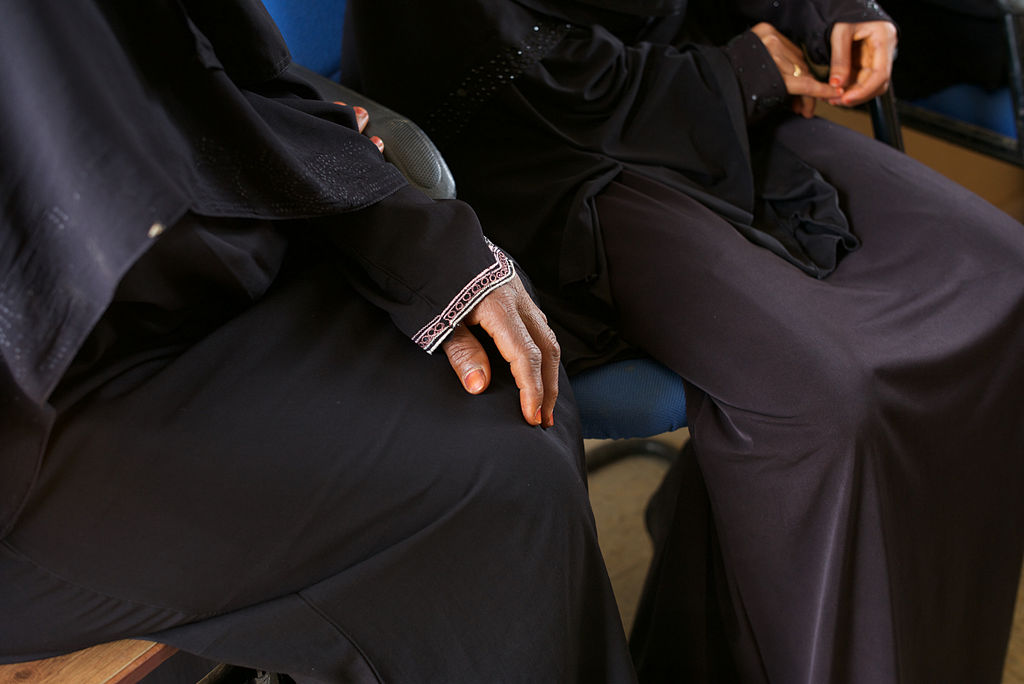Cover Photo: In Yemen there is about a 10% difference between girls and boys primary school attendance rates. We have programmes to address this. We also encourage older girls to go back to school. Julien Harneis from Sana’a, Yemen Wikimedia Commons [CC BY-SA 2.0]
Being a woman in the developing world can be quite an arduous challenge: Women are too often amongst the poorest and most mistreated groups in less developed countries, with the widespread problem of gender discrimination in the third world (which does exist in the rich world as well, though in different, subtler forms) often taking a severe dimension. Amongst the many deprivations women face in developing countries, an oft-overlooked yet crucially important one is their lack of education and literacy: Women are frequently barred from attending schools and attaining even the most basic educational levels, a hindrance stemming not just from poverty (whence the unaffordability of a “luxury” such as education if your entire daytime is to be devoted to feeding your family) or infrastructural shortcomings like the absence of schools in rural areas, but also and especially from the prevalence in most of these countries of an androcentric culture considering women’s literacy as something extravagant, unconceivable, or even nefarious for their family’s stability and their husband’s prestige. Yet, allowing women to access education and improve their human capital would prove of sizeable importance for the living conditions of women themselves and for their country’s development as well.
Having little or no education translates into women being prevented from accessing the job market, with their sole occupational choice ending up being unremunerated (and often unrecognised) household chores or self-subsistence activities. Educated women, even at the most basic literacy levels, would have greater chances of being employed in actual jobs and eventually becoming breadwinners for their families alongside their husbands. This would be thrice beneficial to necessitous households: They would see their overall wealth increase, their risk of falling into deep poverty in case the husband suddenly lost his job would be curtailed, and the wife’s influence in the family decision-making would soar, putting her on a closer level to her spouse’s. Why this last outcome would be desirable is proved by an extensive body of literature thereupon, showing how income earned by women in developing countries is more likely to be spent on (or invested in) children’s nutrition and education compared to the one earned by men (which on the other hand is seemingly more prone to be squandered in “lecherous expenses” such as alcohol, tobacco, and prostitution). It is not hard to witness in our daily lives – even without economic research telling us so – how a mother is capable of endeavouring much greater exertions and hardships when her offspring’s health and safety are at stake than a father could. Empirical research in the field of education further shows how women and especially young girls frequently prove to be eagerer and more tenacious learners than boys and no rarely do they attain better grades, thereby also functioning as buffers and motivators for the schooling achievements of their male peers, who would in turn be induced to study harder lest they be beaten by their female schoolmates . Probably, the consciousness of their mothers and grandmothers having been previously barred from education makes girl better appreciate its value when given the chance to enjoy it.
An even simpler, arithmetic reason for why giving women the same tools of men to earn a life would be beneficial on a nation-wide level is that, for as long as this does not occur, approximately half of the country’s talent pool is doomed to remain unexploited and not to contribute to the country’s development. It is doubtless that women are on average no worse than men (even though such an idea keeps being unthinkable and fiercely rejected in some areas of the world) but in several fields they can actually prove to perform even better than the latter: Psychological research (but common wisdom as well) shows that females do possess on average some sort of comparative advantage in various tasks, with their different cognitive attitude enabling them to attain better results compared to males. As long as access to such occupations, or more in general to any other form of responsibility job, is legally or practically forbidden to women, useful resources for national growth and development simply go wasted. These are just a small sample of the many returns that investments to educate women could accrue to a country; one might also mention the fact that a society which is less male-dominated and which shows a more gender-equal participation to the job market, political life etc. is likelier to harbour a peaceful and collaborative culture and be less prone to beget and nurture terroristic groups. And though the idea of being ruled or administered by a woman might sound horrific to many, history has shown how they too can be wise and charismatic leaders (think for instance about Margaret Thatcher or Golda Meyr, just to mention a few). Or, if bringing up past world history sounded too fanciful to practical-minded people, then a quick glance to the sheer number of Fortune 500 companies led by a woman CEO might be more telling. This clearly does not mean that women are intrinsically better than men or that unrestrainedly and carelessly transferring the reins of power to women just because they are women would be the solution to all ills of humankind (it would probably be just as detrimental, given that the weaknesses of human nature tend to be ubiquitous between sexes), but neither perpetuating the current gender disparity would.
I have presented so far mainly utilitarianist arguments to advocate for women’s freer access to literacy, but it is to be added and firmly restated that education is first and foremost a right that women are unlawfully being denied and its most important benefit would be women’s chance of finally getting emancipated from their too-often miserable and demeaning living conditions. The list of the countless humiliations and abuses faced by women in many developing countries is dismally long, ranging from the mere prejudice of inherent inferiority and ineptitude to unequal pays and salaries, to heinous infringements of basic human rights in the shape of domestic violence, enslavement, human trafficking, rapes, and forced prostitution, all maltreatments they have neither the power nor the chance to oppose. They are likely to be provided with less food and healthcare compared to their male peers or even brothers and frequently face the tangible threat of dying of childbirth because of neglected sanity and harmful mutilations such as infibulation. Moreover, they are often legally prevented from owning property or signing contracts, making them entirely dependent on their spouse also from a legal standpoint.
Such dire conditions have been further worsened by last years’ global stagnation, which, though arisen in the rich West, bitterly affected developing countries alike through the channel of foreign commerce. The ensuing harsh contraction in their domestic informal sector, with sharply falling demands for traditional female occupations such as gardeners, nurses, weavers etc., had the result of making countless women lose their sole source of income, plunging them back into poverty. Such stagnation also brought about peaks in staple food prices, which, combined with lower salaries and higher unemployment, resulted in worsening nutritional and health conditions for the poor as a whole, but especially for poor women and girls, as we said that their daily caloric intake is often curbed and sacrificed in favour of their husband’s and brothers’. Several women were forced to cope with impending poverty by embarking upon dangerous and illegal activities like prostitution or drug smuggling, and their risk of dying of childbirth increased even more as governments were forced to withdraw resources from healthcare. Unemployment further led to an increase in the frequency of domestic violence, as jobless husbands too frequently found in it a venue to discharge their frustration onto their harmless wives.
Just to make the picture even dourer, physical factors such as climate change are increasingly joining socio-economic ones to the relentless deterioration of women’s conditions. It is predicted that tropical countries will be (and most already are) the ones most adversely affected by extreme weather event, with forecast and actual widespread crop damages and an alarmingly mounting frequency of calamities such as floods and droughts. Amidst country-wide distress, it is women who are likely going to be the ones affected most harshly, owing primarily to their significantly limited mobility, that is their greater inability to move away from stricken areas seeking better places where to settle. This in turn originates form their unequal access compared to men to land ownership, credit availability, and any decision-making institution which would help them escape or alleviate their misery, as well as on their greater dependence on agriculture, itself a consequence of their lack of education.
It is to be highlighted that perhaps the most pernicious and tenacious roots of this disheartening enumeration of inequalities and abuses is once again the chauvinist and androcentric dominant culture of several countries, where females are considered from feeble-minded, unworthy individuals, intrinsically inferior to males in every aspect, to mere tools of their husbands’ for childbearing and physical pleasure, up to the point of completely denying their very basic rights. Even in less extreme cases, girls being treated less fairly than their male peers is notoriously the normality in many poorer countries. It is this pervasive mentality the main obstacle interposing between women and their attainment of a fairer treatment and against which they must fight – and the global community at their side. As the culture we grow up in durably shapes our ideals, self-perception, and mental tenets, women immersed in these cultures are frequently the first ones to be deeply convinced of their inescapable inferiority to males and the justness of such unequal treatments. Education would help them to get rid of these mental shackles and lead them along the path of self-empowerment and self-esteem as individuals endowed with the same worth and capabilities of men and the same right to aspire to a better and freer life.
In recognition of how these cultural prisons are actively obstructing any further progress in women’s rights affirmation, the UN implemented in 1979 the Convention on Elimination of All Forms of Discrimination Against Women (CEDAW for short), which legally bound all signatory nations to eliminate any form of gender-discriminating law in their legal systems… Or, at least, it should have bound them, given that the sheer number of reservations placed by signatories to actually limit the Convention’s effects on the basis of “cultural threatening” – the same scapegoat many other countries exploited to justify their not signing the Convention at all – is a revealing clue of these countries’ and their rulers’ actual commitment thereto. But to keep discriminating women or giving them less opportunities on the sole basis that “that is what forefathers always did” is a morally unacceptable justification. Still, there is little chance of things to change and ameliorate for as long as women in these countries will remain uneducated and ignorant of their rights.
In synthesis, even though women’s conditions in many parts of the world are still far from acceptable, education can be an indeed powerful tool to empower women in developing and\or culturally retrograde countries, to improve their social status and living standards, and for them to break free from the many cultural and physical limitations placed onto them. Furthermore, educated and active women can turn out to be a precious resource for countries striving to advance on the path towards development and growth, with the progressive reduction of male predominance in the society in favour of a more balanced and equitable system turning out already in the short run to be a valuable and beneficial investment for the prosperity and well-being of all.











































